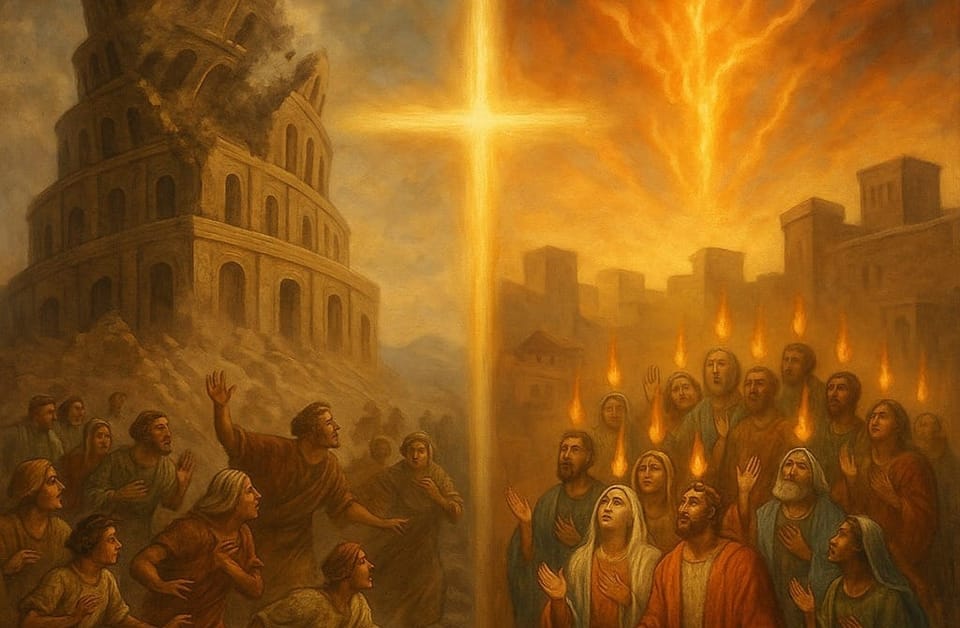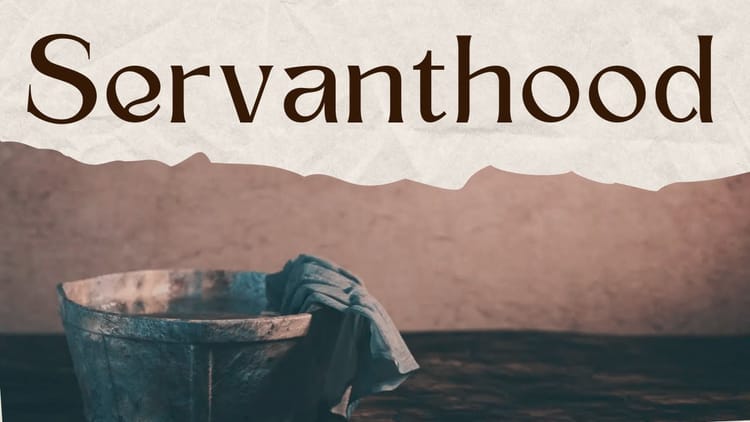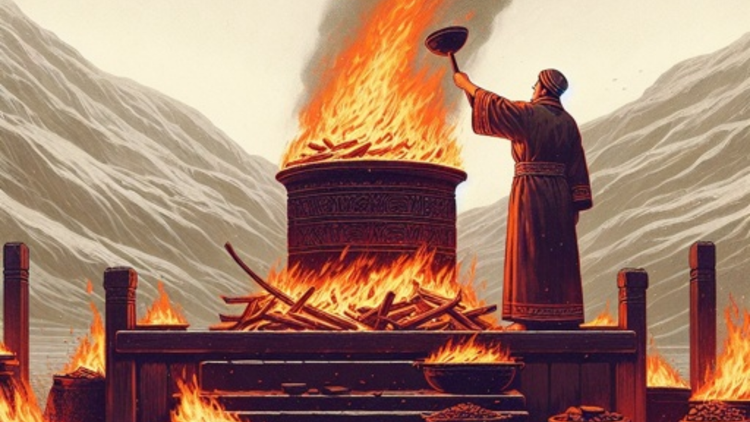Reclaiming the Nations

This post was originally authored and published on Facebook by John Daniels. It brings much clarity to the mysteries of Pentecost by considering details often overlooked, misunderstood, or unfortunately, misinterpreted. I may not personally agree 100% with everything Mr. Daniels writes, but the main focus of this article is both eye-opening and faith-building. This can help us understand how the biblical narrative contained in the Old and New Testaments creates a complete and glorious story of God's plan for mankind. I pray this blesses you as it has me as we dig a little deeper into God's purpose for Pentecost.
Pentecost and the Reversal of Babel: Reclaiming the Nations for Yahweh by John Daniels
The biblical narrative does not unfold randomly—it is a carefully structured drama of rebellion, judgment, and redemption. One of the clearest examples of this pattern occurs between two seemingly distant events: the judgment at the Tower of Babel in Genesis 11 and the outpouring of the Holy Spirit at Pentecost in Acts 2. While Babel marked the disinheritance and scattering of the nations due to collective rebellion, Pentecost served as a supernatural reversal of that judgment and the formal beginning of Yahweh's mission to reclaim the nations under the rule of His Son, Jesus the Messiah.
BABEL: HUMANITY’S UNITED REBELLION AND YAHWEH’S JUDGMENT
In Genesis 11, mankind, still united by one language and culture, gathered in defiance of God’s command to spread out and fill the earth (Genesis 9:1). Instead, they sought to build a tower—a ziggurat—that would "reach to the heavens" and make a name for themselves. This act was more than urban planning or architectural ambition; it was a spiritual rebellion. In the Ancient Near East, ziggurats symbolized sacred space, portals between heaven and earth, where humans could manipulate the gods. The Tower of Babel, therefore, represented a counterfeit mountain of assembly—an attempt to storm heaven and force divine presence on human terms.
God responded not by destroying them physically but by confusing their language. This act severed their ability to conspire as one. More significantly, according to Deuteronomy 32:8–9 (LXX and Dead Sea Scrolls versions), God responded by disinheriting the nations:
"When the Most High gave to the nations their inheritance,
when he divided mankind,
he fixed the borders of the peoples
according to the number of the sons of God.
But the Lord’s portion is his people,
Jacob his allotted heritage."
This passage reveals a profound truth: Yahweh handed over the rebellious nations to lesser divine beings—members of the heavenly host often referred to as the bene elohim [sons of God]. These beings were expected to rule justly, but Psalm 82 shows that they instead oppressed and corrupted the nations under their charge, leading Yahweh to declare their doom. From Babel onward, Yahweh would focus on a single nation—Israel—through whom He would eventually bless all the nations (Genesis 12:3).
PENTECOST: THE GATHERING BEGINS
Fast forward to Acts 2. The Jewish feast of Shavuot (Pentecost) had brought devout Jews and proselytes from across the known world to Jerusalem. This was the perfect stage for the next act in Yahweh’s redemptive plan. As the disciples gathered, the Holy Spirit descended like a mighty rushing wind, and tongues of fire appeared over them. They began speaking in other languages—not gibberish, but the real, known languages of the dispersed Jewish and Gentile populations present.
[Jan's Note: I am not in agreement with the author's descriptive reference to the gift of "unknown tongues" but agree that known languages were being supernaturally spoken as the Gospel was clearly proclaimed in their own languages to all who gathered together that day.]
This was not a coincidence. Luke, the author of Acts, intentionally records the nations represented: Parthians, Medes, Elamites, residents of Mesopotamia, Judea, Cappadocia, Pontus, Asia, and many more (Acts 2:9–11). These regions directly correspond to the Table of Nations in Genesis 10—a traditional list of the seventy (or seventy-two) nations descended from Noah. The message is clear: the judgment of Babel is being reversed. Instead of humanity ascending to God in pride and being scattered, God descends to humanity in humility and begins the process of regathering.
THE SUPERNATURAL AND COSMIC RECLAMATION
Pentecost was not just about communication—it was about cosmic authority. Jesus had told His disciples in Matthew 28:18–19, "All authority in heaven and on earth has been given to me. Therefore, go and make disciples of all nations." This was a direct claim that the authority once exercised by the gods over the nations (delegated in Deuteronomy 32:8) had been stripped from them. Jesus, through His death, resurrection, and ascension, had reclaimed what they had corrupted. Ephesians 1:20–22 echoes this, stating that Christ was raised and seated “far above all rule and authority and power and dominion,” referring not to human rulers but to spiritual ones.
At Pentecost, empowered by the Spirit, the apostles proclaimed Jesus as Lord, and 3,000 were added to their number. Many of these were likely pilgrims who would return to their nations, bringing with them the seeds of the gospel. This was the beginning of the reclamation—not just of individuals, but of entire people groups that had long been under the sway of rebellious elohim.
LUKE’S LITERARY DESIGN AND THE SYMBOLISM OF THE NATIONS
Luke, writing Acts, carefully constructs the narrative to reflect this theological truth. When Jesus sends out seventy (some manuscripts say seventy-two) disciples in Luke 10, the number is symbolic. In Jewish tradition, seventy nations were believed to represent the totality of humanity after Babel. The commissioning of the seventy is a symbolic prophetic act—just as the gospel is for all, so is the mission.
This symbolism continues in Acts. The tongues spoken at Pentecost are not random—they are a sign that Yahweh’s Spirit is now moving to undo the divine divorce enacted at Babel. He is gathering a people from every tongue, tribe, and nation to become one in Christ, just as Paul describes in Ephesians 2:14:
“For he himself is our peace, who has made the two groups one and has destroyed the barrier, the dividing wall of hostility.”
THE DIVINE COUNCIL AND THE WAR FOR THE NATIONS
To fully appreciate Pentecost’s significance, we must understand it within the Divine Council worldview. Yahweh was not just reclaiming people—He was invading the territory of rival gods. Every conversion was a blow to the authority of the principalities and powers who had ruled those nations since Babel. Paul affirms this in Colossians 2:15, declaring that Christ “disarmed the rulers and authorities and put them to open shame, by triumphing over them.”
In this context, Pentecost was a declaration of war. Not a war of swords, but of Spirit. The kingdom of God was breaking into enemy territory, and the principalities of the air would fight back. But the victory was already assured. The presence of the Holy Spirit was not only a comforter—it was a sign of the age to come, the beginning of the regathering of Yahweh’s lost inheritance.
CONCLUSION:
Pentecost was not an isolated event; it was the reversal of a cosmic fracture. At Babel, the nations were scattered and handed over to lesser gods in response to their rebellion. At Pentecost, through the power of the risen Messiah, Yahweh began calling those nations back—not through domination, but through the Spirit and the proclamation of the gospel.
The Church is the instrument through which this mission continues. Every time the gospel is proclaimed, every language it is translated into, and every heart it reaches, is another piece of Babel being undone. The nations that were once disinherited are now being invited back into the family of the Most High.
This is not merely history. It is our task. The reversal of Babel began at Pentecost—and it will be completed at the return of Christ, when every knee shall bow and every tongue confess that Jesus Christ is Lord.
DISCUSSION QUESTIONS
1. How does the judgment at Babel connect to the command of the Great Commission?
2. Why is it significant that people from every nation heard the gospel in their own language at Pentecost?
3. How does Pentecost set the stage for the global mission of the Church?
4. In what ways is the modern Church continuing the work of reclaiming the nations?
WANT TO KNOW MORE?
MICHAEL S. HEISER, THE UNSEEN REALM: RECOVERING THE SUPERNATURAL WORLDVIEW OF THE BIBLE
Relevance: Heiser’s work is foundational to understanding Deutonomy 32:8–9 in light of the Divine Council worldview. He argues that the division of the nations at Babel was not merely geographic or linguistic, but spiritual—a disinheriting act where Yahweh assigned the nations to lesser elohim. He also shows how this act set the stage for Yahweh to focus on Israel, and how Jesus’ Great Commission and Pentecost mark the beginning of reclaiming those nations.
Where it connects in the article:
- The explanation of Babel as not just linguistic but divine judgment (Deut. 32:8–9)
- Psalm 82’s critique of the corrupt rule of these beings
- Pentecost as Yahweh’s counter-move to reclaim the nations
Key Chapter to consult: Chapters 14–16 (on Babel, the Table of Nations, and the divine disinheritance)
N.T. WRIGHT, ACTS FOR EVERYONE, PART ONE: CHAPTERS 1–12
Relevance: Wright, a respected New Testament scholar, provides clear commentary on how Luke intentionally presents Pentecost as a global moment with massive theological implications. He notes how the nations listed in Acts 2 are meant to symbolically represent the whole world, and that the unity through the Spirit directly counters the division at Babel.
Where it connects in the article:
- Acts 2 and its symbolic link to Genesis 10
- The literary design of Luke showing Yahweh’s mission to reclaim the world
- The emphasis on the Spirit empowering witness to the nations
Key Sections: Commentary on Acts 2:1–13 and Luke 10 (the sending of the seventy)
JOHN B. POLHILL, ACTS (NEW AMERICAN COMMENTARY)
Relevance: Polhill’s commentary provides a scholarly and conservative exegesis of Acts 2. He emphasizes how the miraculous speaking in tongues at Pentecost was intelligible and symbolically reversed Babel. He also explores the missionary impulse of Acts, noting how the gathered nations become the launchpad for the gospel to spread across the known world.
Where it connects in the article:
- Clarifies the linguistic miracle at Pentecost
- Supports the idea that the nations present mirror the dispersion of Genesis 10
- Frames Pentecost as the true beginning of global missions
Key Sections: Acts 2:5–11 commentary, including historical notes on the diaspora and pilgrims
CRAIG S. KEENER, ACTS: AN EXEGETICAL COMMENTARY, VOL. 1
Relevance: Keener’s monumental work provides thorough background on the nations listed in Acts 2, the role of Shavuot/Pentecost in Second Temple Judaism, and the supernatural nature of the events. He connects Acts 2 to prophetic expectations (Joel 2), Deuteronomy 32, and the reversal of Babel as part of Luke’s intent.
Where it connects in the article:
- Historical and geographic significance of the listed nations
- Second Temple expectations of God reclaiming the Gentiles
- The theological meaning of tongues as a sign of global inclusion
Key Sections: Acts 2:1–13; excursus on Shavuot; appendix on diaspora geography
T. DESMOND ALEXANDER, FROM EDEN TO THE NEW JERUSALEM: AN INTRODUCTION TO BIBLICAL THEOLOGY
Relevance: Alexander traces the biblical story from Eden to Revelation emphasizing themes of sacred space, divine presence, and the restoration of the nations. While not focused solely on Babel or Pentecost, his work helps frame the larger narrative arc—how God’s plan to dwell with humanity and rule the nations through His chosen people climaxes in Christ and begins spreading out again at Pentecost.
Where it connects in the article:
- Establishes the theological storyline of scattering and gathering
- Frames Pentecost as the beginning of the end-time restoration
- Helps show how Acts fits within a broader canonical theology
Key Sections: Chapters 4 (The Scattering of the Nations), 6 (God’s Presence and the New Humanity)






Member discussion